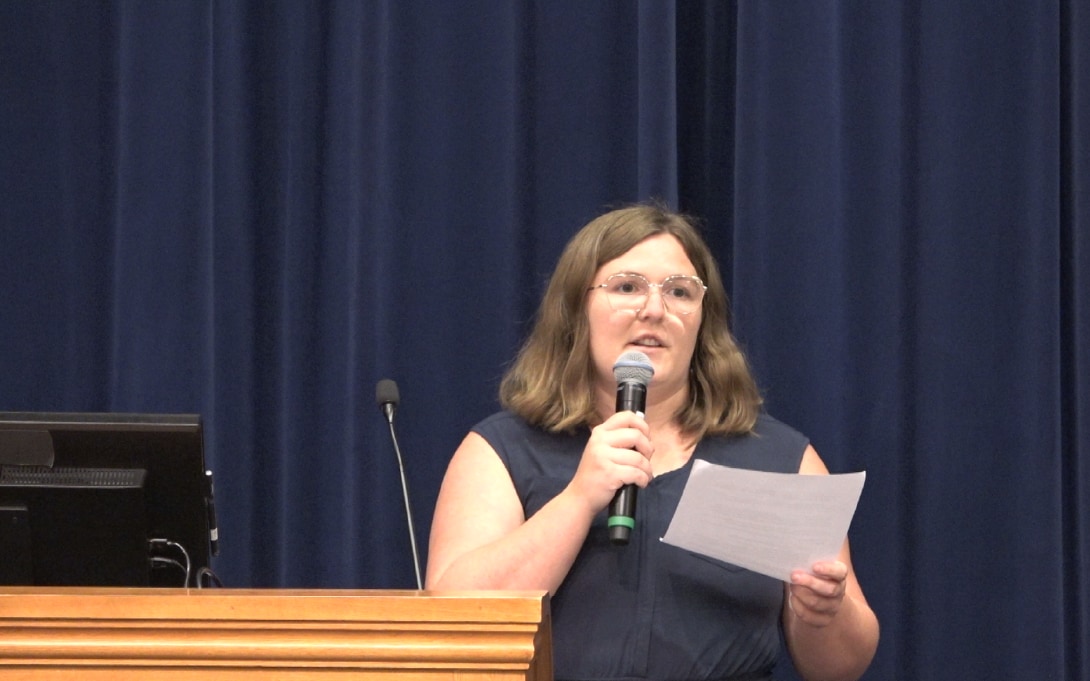
Eleven talented students showcased what they learned during their summer internship at the Ford School 7th Annual Policy Pitch Competition. Undergraduate and graduate students spent three minutes sharing their key deliverables, policy impacts, and lessons learned with the chance to compete for 1st, 2nd, and 3rd student prizes.
The panel of judges awarded students based on the clarity and effectiveness of the presentation, the potential policy impact of their work, and how it influenced the student’s long-term goals. Judges included: Yousef Rabhi, Washtenaw County Commissioner, Rohan Dharan (BA’13), Manager of Secondary Advanced and Enriched Instruction at District of Columbia Public Schools, and Latesha Love-Grayer (MPP’02), Director of International Affairs and Trade at US Government Accountability Office.
Georgina Bailey (MPP ‘25) – Lansing Board of Water & Light
Good evening. For those who don't know me, my name is Georgina Bailey, and I'm here to talk to you about a policy area that is often overlooked, but will directly impact you on probably the worst day of your life: emergency management. It's my goal by the end of this pitch that each one of you believes that emergencies are going to affect all of us, and that we can prepare and plan for them to become resilient communities.
Before I do that, let me share. Why has this become my policy calling? On March 16th, 2020, COVID was declared an emergency in my city. The next 2 years of my life I worked on teams where we were flying by the seat of our pants to cobble together emergency orders, emergency plans, and generally try to solve an emergency that we had no idea was coming or knew how to deal with.
And I remember the whole time thinking: Why aren't we prepared for this? We are the government. We love to prepare for things, we love to fact check, we love to forecast, so why aren't we doing this for emergencies? And I'm willing to bet it's because all of us in this room and in the government believe we're more prepared for emergencies than we actually are.
I'm looking for some audience participation here. If you were on fire, what would you do? If a tornado happened. What would you do? If the electric grid went out and 30,000 people were without power, and while trying to restore the grid, your utility company was hijacked by a cyber attack, and while responding to one of the emergencies, an employee died?
I imagine a lot of you are thinking right now, “That is not my job to know. There are so many smart and talented people in the Government who know what to do, and will tell me what to do.”
I hate to be the bearer of bad news, but that was the project I ran this summer. Leading the organization through a scenario that was the electric grid scenario.
I'll never forget walking into that room introducing that scenario and an executive turning to his friend and saying, “We have an emergency management department.”
So this summer I worked for the Lansing Board of Water and Light – the BWL – as their emergency management intern. It was my job to work with the Emergency management department to make sure that the BWL, which is a utility company, was able to respond to any emergency
Prior to the exercise, no one in the organization had ever read any of the emergency plans. No one knew what their role was, and most of that day was spent trying to educate people on what emergency management even was, and why? It was important to the organization.
The answer to the question, “What do you do when the electric grid goes down, and how can we become more resilient in these communities?” is, we have a plan, and that organization understands what the plan is, what their roles are within the emergency, and when the emergency rolls around they are able to execute the plan.
But if you don't know what the plan is, if you don't have a plan and you don't practice the plan, emergencies are going to happen, and your organization is going to be unprepared, and your community will face the consequences.
From my internship, I'm clearer than ever that I am going to pursue my policy career in local emergency management because there is so much work to do. And it's my mission to convince people that emergencies are coming, but we can become more resilient if we prepare together.
Read the other pitches:
Georgina Bailey – Lansing Board of Water & Light
Bridget Corwin – Great Lakes Renewable Energy Association
Audrey Dombro – City of Philadelphia, Office of Transportation and Infrastructure Systems
Nia Knox – UM Poverty Solutions
Emily Kuttner – City of Chicago, Mayor's Office
Alexie Milukhin – The Institute for College Access and Success (TICAS)
Samuel Owusu – U.S. House of Representatives, Committee on Education & the Workforce
Aiswarya Padmanabhan – Trust for Social Achievement
Katrina Wheelan – City of Detroit, Office of Budget